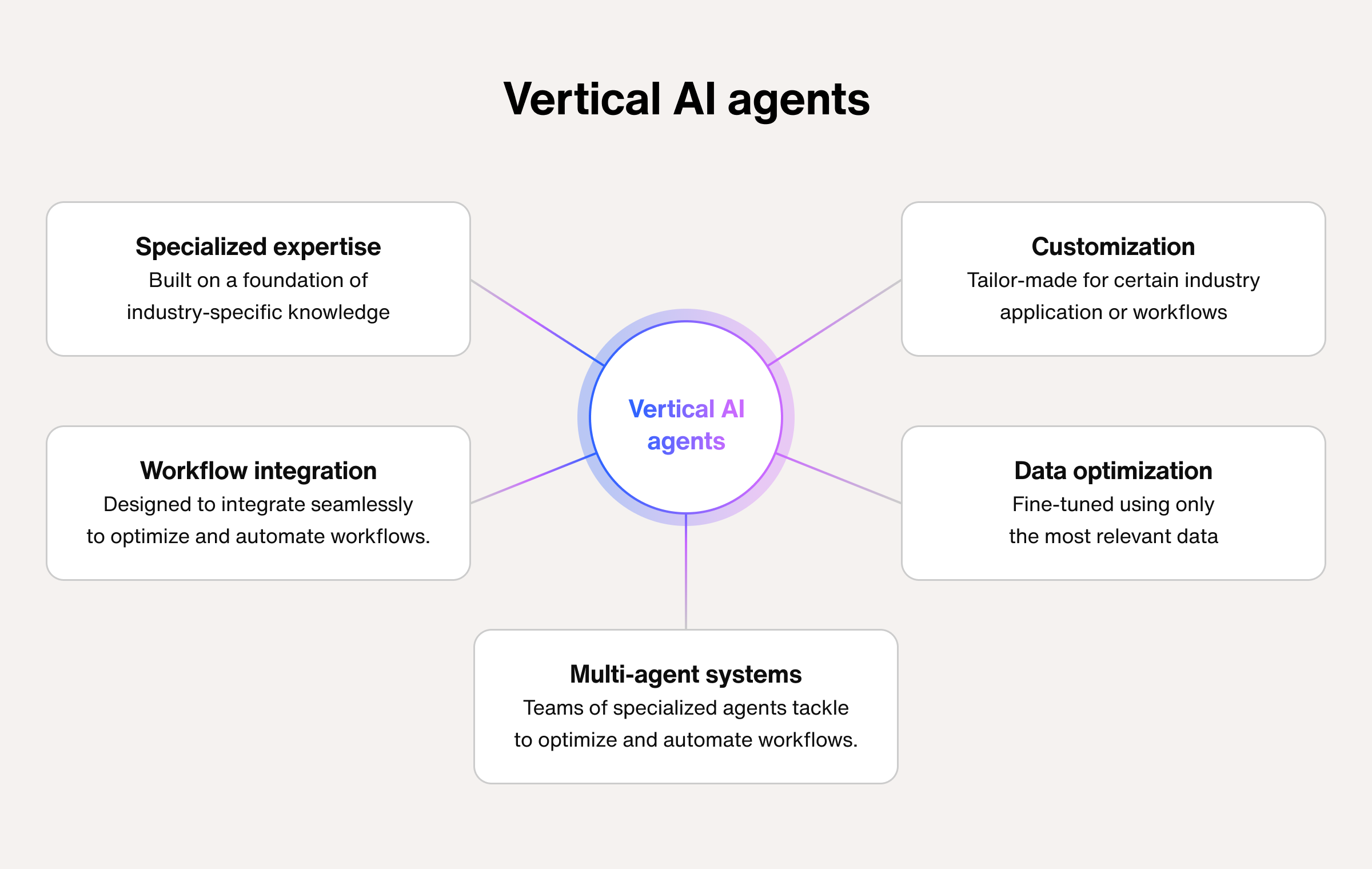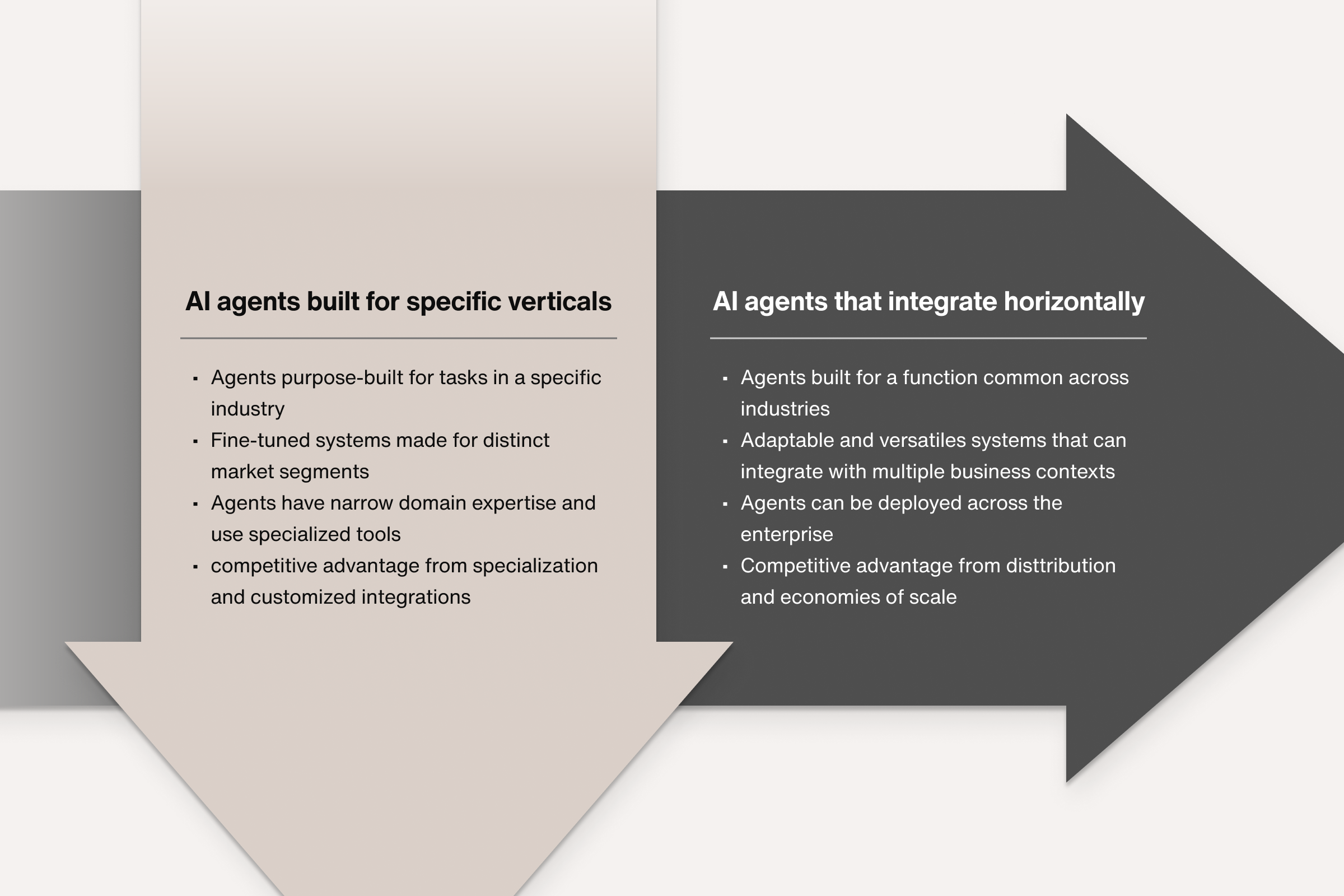What are vertical AI agents?
As AI technology advances, it’s become clear that general-purpose AI often lacks the precision and depth to tackle industry-specific problems. As a result, there’s a growing demand for tailored AI solutions that address the real challenges of particular industries. This brings us to the next logical step in the evolution of AI—vertical AI agents.
What are vertical AI agents?
Vertical AI agents are AI systems tailor-made for specific tasks or workflows in a particular domain or industry. Unlike general-purpose AI models like ChatGPT, which are designed for a broad use across fields, vertical AI agents are customized to address specific challenges and optimize workflows within a particular vertical sector.

Automate customer service with AI agents
Key characteristics of vertical AI agents
In addition to being AI agents that think and act autonomously, vertical agents have a set of distinct characteristics that make them suitable as specialized tools.
The key characteristics of vertical AI agents include:
Specialized expertise: Vertical AI agents are built on a foundation of deep, industry-specific knowledge. Designed to understand the nuances of a specific industry or user, they can execute specialized tasks on their own, such as legal contract analysis, medical diagnostics, financial risk assessment, and more.
Customization: Vertical AI agents aren’t just adapted to a particular industry, they’re originally built for specific industry applications and workflows. This level of fine-tuning enables them to interpret and act on industry-specific datasets with unmatched efficiency and precision.
Data optimization: Vertical AI agents are fine-tuned using only the most relevant first and third party data. This makes them far more accurate, reliable, and effective for niche applications than AI tools trained on generic information.
Workflow integration: Vertical AI agents are designed to integrate with existing systems and tools, allowing a business to optimize workflows without disrupting them.
Multi-agent systems: The true power of vertical AI agents lies in multi-agent systems, where a team of specialized agents work together to tackle complex challenges, and even achieve end-to-end AI workflow automation.

Why do vertical AI agents matter?
As businesses face increasingly complex challenges in their industry, vertical AI agents have emerged as a customizable solution with the capabilities required to solve real business problems.
By combining specialized expertise with autonomous decision-making, vertical AI agents are poised to redefine operational efficiency and automate entire processes that have been too complex until now.
Here’s how vertical AI agents benefit a business:
Solve complex problems: Tackle complex business problems with a combination of domain-specific expertise, autonomous decision-making, and real-time data, offering a level of precision that general-purpose AI can’t match.
Improve productivity: Streamline operations and automate intricate tasks using a tailor-made solution for unique environments or industry applications that drives greater productivity and efficiency.
Increase competitiveness: Get a competitive edge using advanced, tailored solutions that improve decision making and operational effectiveness by automating tasks within a specific domain.
Realize ROI faster: Achieve benefits and measurable results in less time with custom solutions that fit seamlessly into AI agentic workflows, allowing for rapid employee adoption and faster realization of value.
Enhance decision making: The niche knowledge base of vertical AI agents simplifies and improves the quality of their decision making, leading to superior customer interactions, unique insights, and novel solutions to business problems.
Accelerate implementation: Due to their specialized functionalities, vertical AI agents can be deployed more quickly and integrate seamlessly into existing systems.
How are vertical AI agents different from horizontal AI agents?
Vertical AI agents bridge the gap between the general-purpose AI tools that have emerged since ChatGPT and the specific demands of a certain industry. Typically built on a large language model (LLM) of domain-specific intelligence, vertical AI agents are customized with targeted prompt engineering and fine-tuned with industry-specific datasets.
Horizontal AI agents, on the other hand, are general-purpose systems that can be applied across various industries for a broad range of tasks. For example, horizontal AI can include natural language processing models like ChatGPT, AI chatbots, or predictive analytics—all of which are useful in many contexts. Adaptable to multiple industries and uses, horizontal AI can also focus on a particular business unit, such as AI for cybersecurity or AI for customer service.
In short, horizontal AI offers broad applicability and versatility across multiple industries and tasks, while vertical AI is a tailored solution to a niche problem or process in a specific industry.

Applications for vertical AI agents
With vertical AI agents, a business can embed industry-specific expertise and fine-tuned intelligence into real-time business systems to solve persistent challenges. Whether aimed at enhancing innovation, decision-making, or efficiency, the applications of vertical AI are as exciting as they are limitless.
Here are some examples of vertical AI agents across industries:
Vertical AI for finance
Vertical AI agents are revolutionizing fraud detection and risk assessment in the finance industry. For example, specialized AI can analyze spending patterns, user behavior, and geolocation to identify and stop fraud in real-time. AI for credit scoring can instantly assess a customer’s spending habits and financial history to assist with lending decisions and automate loan approval.
Vertical AI for healthcare
Vertical AI is elevating standards of patient care and administrative efficiency in healthcare organizations. For example, specialized agents bring exceptional precision to medical imaging and symptom analysis, enhancing diagnostic capabilities and providing tailored treatment plans to automate remote care, reduce human error, and improve patient health outcomes.
Vertical AI for legal and compliance
Vertical AI agents are automating time-consuming processes such as document review, contract analysis, and regulatory compliance. Since they’re fine-tuned on a company’s relevant internal documentation, a vertical AI agent can analyze documentation, transactions, or legal documents with a trained eye. This enables automated document processing that’s aligned with the specific goals, standards, and legal requirements of an organization.
Vertical AI for manufacturing
With their specialized expertise, vertical AI agents are poised to automate and optimize a variety of manufacturing processes. For instance, AI-powered quality inspection uses computer vision to analyze product quality with unprecedented precision to automate defect detection. Meanwhile, an agent for predictive maintenance can monitor machine performance, anticipating failures to prevent equipment breakdowns, reduce downtime, and maximize asset health.
Vertical AI for retail
Large retailers like Amazon use vertical AI agents to optimize and automate supply chain management, including product recommendation, inventory management, and order fulfillment. For instance, the recommendation AI analyzes user behavior and history to suggest products, the inventory AI optimizes stock levels based on real-time data, while the fulfillment AI routes orders to reduce shipping costs. Each contributes its expertise, for a more efficient, cost-effective supply chain.

Boost CSAT with AI customer service
Trends in vertical AI agents for 2025
Vertical AI agents will become more accessible and effective in the coming year, thanks to the proliferation of AI agent platforms and the following AI trends:
Open-source AI models: The release of DeepSeek’s open-source model will democratize access to powerful, unique models that are the core of vertical AI agents. By enabling cheaper model training, greater efficiency, and open collaboration, open-source AI will lead to greater vertical AI adoption.
Pre-built AI agents: Tech leaders like Google, OpenAI, and Oracle are already rolling out AI agents for specific industries, such as automotive, food ordering, customer service, and more. That will simplify the process of deployment, fine tuning, and integration for AI agents in certain verticals.
Responsible AI: In the coming year, there will be a greater emphasis on addressing ethical and regulatory concerns of AI to ensure responsible use. Fortunately, with their fine-tuned intelligence and niche knowledge base, vertical AI agents can better meet strict regulatory demands than broad-spectrum AI.
End-to-end workflow automation: Combining real-time data use, specialized intelligence, and autonomous decision making, vertical agents are set to enable AI workflow automation. By executing entire processes traditionally done by humans, they promise organizations new efficiencies, cost savings, and competitive advantage.
Learn more: How to build an AI agent: The 8 key steps

Automate customer service with AI agents
Vertical AI agents are the future
As the AI space continues to mature, businesses will increasingly reach for targeted solutions to their unique challenges. Vertical AI agents excel where broad-spectrum tools fall short, coupling domain expertise with autonomous decision-making to enhance the precision, reliability, and autonomy to AI-powered workflows and processes.
As adoption increases, teams of vertical agents will be orchestrated in complex workflows, with each agent managing separate tasks and contributing its outputs to a multi-agent system. The result of such coordinated specialization will lead to the AI workforce, where teams of agent specialists work alongside and even replace human specialists.
Overall, vertical AI agents have emerged as a transformational force that’s poised to deliver operational efficiency, transform workflows, and enhance the business value of AI projects.
To learn more, you can check out these related resources:
Getting started with vertical AI agents
It's never been easier or more cost-effective to build a vertical AI agent. If you're considering how to maximize AI in your organization, Sendbird can help.
Our team of friendly AI experts can help you build, manage, and optimize a custom AI agent for customer service or any other application across the entire AI lifecycle.
To learn more, contact sales or explore our approach to building an AI agent.











